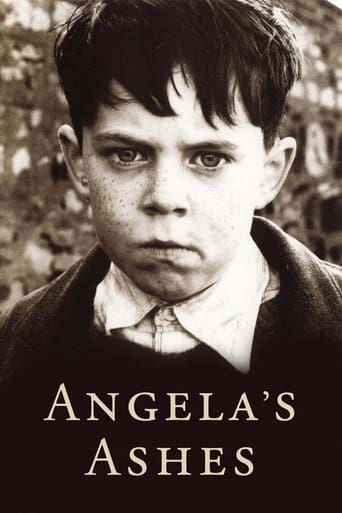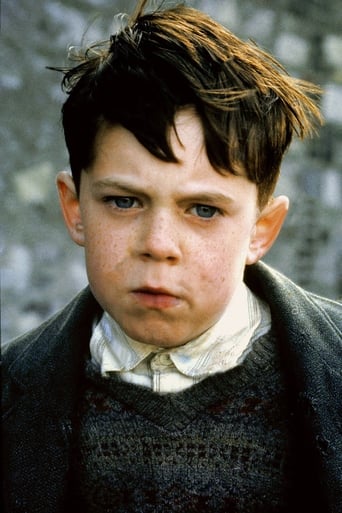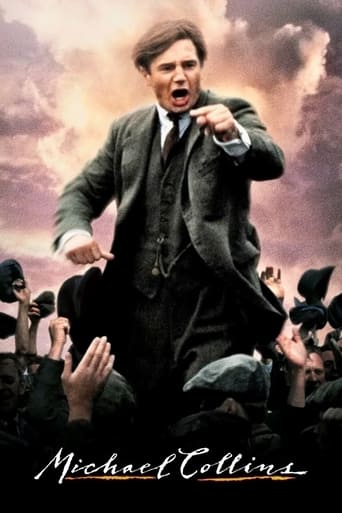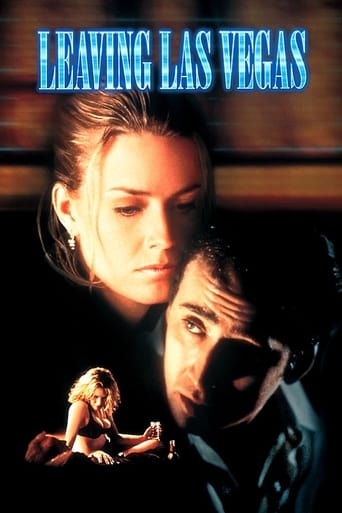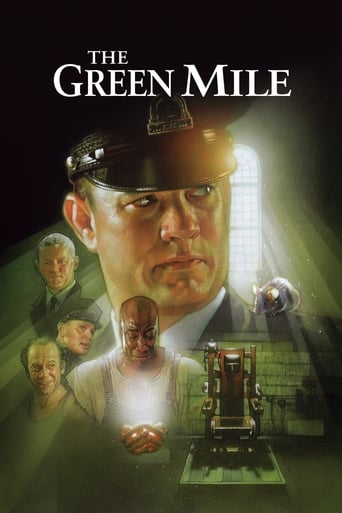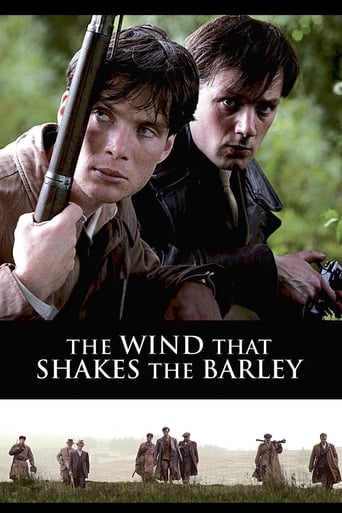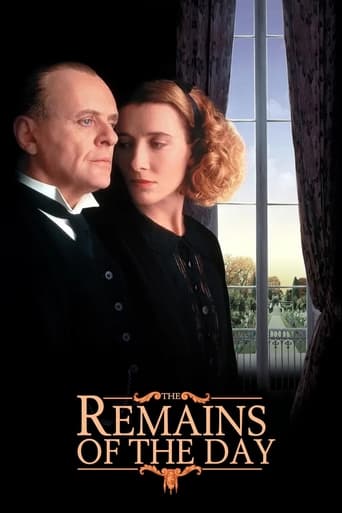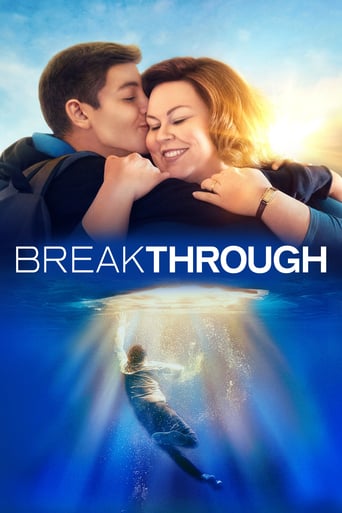Angela's Ashes (1999)
Based on the best selling autobiography by Irish expat Frank McCourt, Angela's Ashes follows the experiences of young Frankie and his family as they try against all odds to escape the poverty endemic in the slums of pre-war Limerick. The film opens with the family in Brooklyn, but following the death of one of Frankie's siblings, they return home, only to find the situation there even worse. Prejudice against Frankie's Northern Irish father makes his search for employment in the Republic difficult despite his having fought for the IRA, and when he does find money, he spends the money on drink.
Watch Trailer
Cast
Similar titles

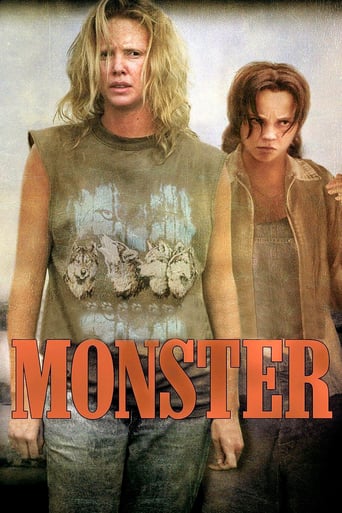
Reviews
Best movie ever!
Admirable film.
it is finally so absorbing because it plays like a lyrical road odyssey that’s also a detective story.
The film makes a home in your brain and the only cure is to see it again.
Engaging bitter-sweet movie.Based on Frank McCourt's Pulitzer Prize-winning book of the same name, the movie details the childhood years of Frank McCourt in Ireland. Hardly the childhood anyone would wish for: abject poverty, three siblings die, father is unemployed and an alcoholic.Shows the conditions some people were, and are, forced to live in. Is pretty much a roller-coaster of misery. Every positive event is followed by a negative one. Very sad.Yet, between these harrowing episodes there's levity and some quite funny moments. If there wasn't, it would probably be too depressing to handle.Most importantly, you empathise with the characters and share in their ups and downs, as all good dramas should cause you to do.On the negative side, the ending feels a bit rushed and incomplete. But then again, the ultimate ending would show the rest of McCourt's life and how it turned out. That would be whole new movie... It certainly was a whole new book, as McCourt wrote a sequel to Angela's Ashes, "'Tis: A Memoir". This has, as yet, not been made into a movie.
Rated 9 out of 10!!!!The film "Angela's Ashes" is a drama that is based on the book "Angela's Ashes" written by Frank McCourt. The film was directed by director Alan Parker who was nominated for two Oscars in 1978 and 1988. The film is classified as a drama because of the type of events that occur the film. The film has a serious tone throughout the whole thing which is based on the poor living conditions and poverty of Ireland between the 1920's and 1940's. Drama is defined as a situation or succession of events in a real life having the dramatic progression or emotional effect characteristic of a film or play. The story starts off with a young Frank McCourt as played by Joe Breen and his family which consists of a mother, father, and 3 brothers and a newly born baby girl all living in the United States. After a harsh time in the United States and a tragic death in the family during the depression they moved back to their home country, Ireland. In a small catholic town the father, Malachy McCourt played by Robert Carlyle unable to find a job due to being an alcoholic and a protestant. After more deaths in the family Malachy McCourt goes to England to look for a job and plans to send back money to support his family. Back at home in Ireland the McCourt family struggling to get by and the children having to go out and scrounge up food just so that they can live. While the mother, Angela McCourt played by Emily Watson has to beg for food from the people around the town who have leftovers. But what happened to Malachy McCourt who went over to England to earn money? As Frankie slowly gets older he realizes that for his family to be able to survive he has to get a job and successfully got a job pouring coal into holes in the street to supply heating to houses. Later on Frank has to go to the hospital due to a sickness he got from the unclean and dirty town due to the poor sewage from the outside toilets and people dumping their waste into the streets from the middle of the street. Growing up in a rough environment and finally a teenager Frank finds a girlfriend whom he grows very close to but in the end something goes wrong and Frank can't do anything about it. Malachy McCourt was a character that stood out to me during the film, he was played by Robert Carlyle who won the BAFTA film award in 1998 and also nominated for an Emmy in 2006 for the movie "Human Trafficking." Malachy McCourt stood out t me because of the way he portrays life he seems like he gives up too easily and whenever something goes wrong or even if something is going good he still goes to the bar and blows all of the money the family has(which is not much) on alcohol. When Malachy finally comes home from the bars he can barely walk and is singing Irish songs that he has picked up from his life. But even though Robert Carlyle played a character that was disappointing he played him very well. Without Malachy in the movie the story line would not have been as interesting as it was and without Malachy the story line would have had to be completely different. Malachy of course was born in Ireland but in the north part so he was a protestant and was disliked by the mother in law because she was catholic and also he is an alcoholic and drinks the families' money away. I didn't like Malachy because of the way he lived his life and wasting it by drinking and not supporting his family.The best scene in the film to me was when little Frank McCourt was in school and got in trouble because another kid made fun of his shoes that had a bicycle tire in the bottom so that he had tread and his feet were not showing through the bottom. Frank went to the principal's office with another kid and they both got their wrists slapped with a ruler for a punishment. This scene was my favorite because of the picture that you see when Frankie has these shoes that have a huge piece of rubber on the bottom so he walks like a duck. The worst scene in the movie to me was when Malachy went to England to find a job and he said he was going to send back the money he earned from the job. But deep down you know he will not send any money and probably spend it all on alcohol.If I was the director I would have changed the ending of the movie because the way it ends know it leaves you hanging to think about what could happen after Frankie makes it to the United States. I would have kept the movie going and had a flash forward to what Frankie could have been doing when he was 30 years old and had him with his wife and kids in front of the house holding a picture of his mother and father, and that would have been the ending to the film if I was the director.
I'd have more respect for the author if he'd stayed in Ireland and tried to do something positive for his people."Author" being the appropriate word as apparently Mr McCourt later admitted to making a significant proportion of "Angela's Ashes" up. "Welcome to Ireland - please set your watches back 100 years" as the Aer Lingus cabin crew used to say jokingly to one another. I blame the Brits - I mean why not?You'll never get to heaven if you blame The Pope now will you? However you dress it up,the McCourt's unquestioning acceptance of the Church's teachings and their own position at the absolute bottom of the pile were at least partly to blame for the intense misery of their lives. Set in what is clearly Limerick's rainy season,the movie is an unremitting grind of squalor.Women are merely baby - making machines and if you lose one child you can have another soon enough so you can. In complete contrast to the wonderful "The Commitments" where the very existence of the group is a two - fingered affront to the perceived roles of its members,"Angela's Ashes" shows the Irish people to be fearful,superstitious and totally subservient to the Church/State which is a sign of how much the country has developed in the intervening years. Mr R.Carlyle has a fine old time as the drunken wastrel father .Weak,gaunt and haunted,he is too much of a stereotype to engage any sympathy.Miss E.Watson,doomed to eternal pregnancy by her faith is stoic and loving. "Angela's Ashes" was a huge success as a book because you could put it down,open a nice Merlot,knock up an environmentally friendly sustainable snack then continue to read about some poor sods starving to death in a freezing cold country as you wriggled your toes in your Peruvian Lama wool socks. In the cinema there was no such comfort - hence the movie did rather less well. Misery - it is said - loves company.But apparently only in the privacy of your own home.
If you pitched a movie about historically accurate misery and poverty to any Hollywood exec, none would endure it for more than twenty seconds. So how did this get made? Well, when you present the same dreary idea with the words "It's based on the best-seller," things tend to get green-lighted. You know, there's a ready audience to extract admission fees from. Without that, this project had no possibility of being made. There are exactly zero people in the world clamoring for a generously long, depressing movie.This movie really needed an adaptation that found (or manufactured) some engrossing throughline in the episodic material. Making it filmic instead of a slavishly, literal depiction of the books imagery would have been just dandy too. But no. Rabid fans tend not to like that. They want the book filmed as if the imagery they supplied while reading it were merely recorded. This is the limp task we ask of filmed novels in this era. It's not compelling. Rarely does a movie survive a books fan base.They must have devised special life-sucking camera filters to make this. Everything is grey and torpid. But if there's one thing this story didn't need is to have it's misery overdetermined by ponderous direction, a ponderous script, ponderous production design, a ponderous poster of a scowling child and that ponderous Misery-Vision camera work. As my Irish relatives might say "Oh for f***'s Sake!" Didn't a colored piece of broken glass occasionally end up in their hands that didn't get painted grey by the gloom patrol? Even the fruit is grey in McCourts world.When I first heard his reading of the first page or two of this on NPR it made me laugh out loud. I thought it was going to be a moderate view of his bad childhood relieved by a little humor. Instead I discovered the book to be an exercise in troweling misery upon misery without edification, and I never made it; neither could some of my friends who wanted to open a vein after just a few chapters. It was like paddling upstream through oatmeal (grey oatmeal) wearing a blindfold (grey also). I don't know what this book did for the readers who made it a best-seller, nor did I realize that there were such enormous audiences in the entertainment age hoping to feel seriously miserable. By page 50 I was shouting "We've got it, Frank!" I don't know how I got the tone so wrong from his reading. There's barely a sentence that survives the all-pervading clutch of gloom and death.If this material weren't already exhausted in just two iterations, it could be spoofed perfectly with the figure of death and his scythe gleefully chopping people down mid-sentence every couple of minutes, and extras in the background painting entire fruitstands grey.
